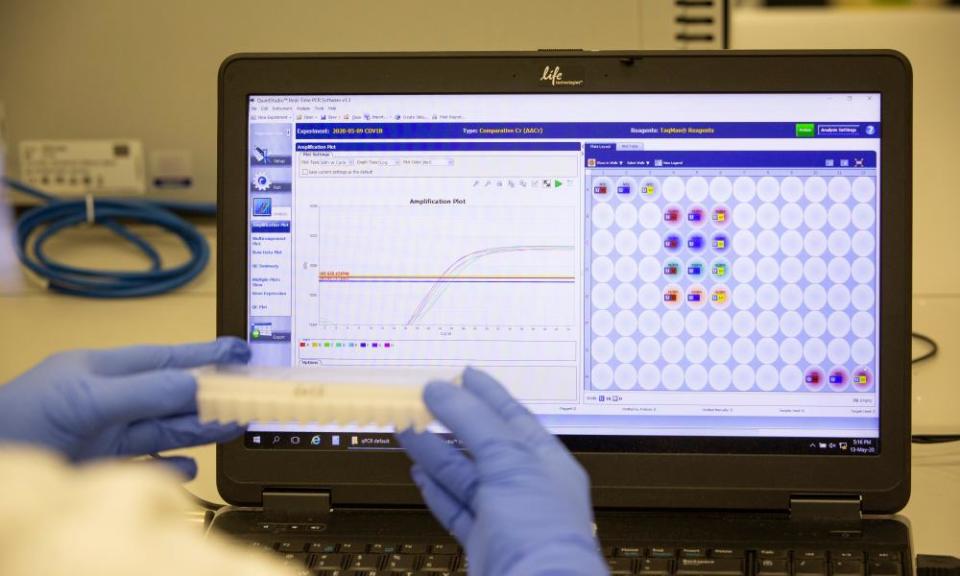Covid testing failures at UK lab ‘should have been flagged within days’

Health officials should have known about major failings at a private Covid testing lab within days of the problem arising, rather than taking weeks to shut down operations at the site, senior scientists say.
About 43,000 people, mostly in south-west England, are believed to have wrongly been told they did not have the virus by Immensa Health Clinic’s laboratory in Wolverhampton in a debacle described as one of the worst scandals in the UK’s Covid crisis.
Related: UK ministers face questions over firm linked to suspected Covid test errors
The affected swabs were processed from 2 September, but neither Immensa’s own quality control processes nor oversight from the UK Health Security Agency (UKHSA) raised the alarm before concerned members of the public complained, triggering a formal investigation.
“In the long list of Covid disasters and scandals, this is pretty near the top,” said Alan McNally, a professor in microbial evolutionary genomics at the University of Birmingham, who helped set up the Lighthouse Covid testing lab at Milton Keynes.
“You shouldn’t be relying on anecdotal reports to spot a problem of this size. That’s the unforgivable thing about this,” he added. “I don’t think it’s going too far to say that an absolute failure of quality in that lab is going to lead to very serious illnesses, maybe hospitalisations, and maybe worse.”
The UKHSA suspended work at the Immensa lab on 12 October, at least three weeks after academics and others raised concerns about discrepancies in regional Covid test data.
The failure has prompted calls for the government to publish its contract with Immensa, transfer as much testing as possible to NHS and university labs, and establish more stringent oversight of the hundreds of private companies that have rushed into the Covid testing business, often without any track record of delivering critical clinical tests.
default
One UK researcher who is familiar with Covid testing, but not authorised to speak on the issue, said the problems at Immensa were almost inevitable given the way in which private companies were brought in to build testing capacity.
“This commercial capacity mushroomed in a very short time and that’s because it was allowed to and encouraged to, and there was very little oversight,” they said. “The technology is so routine now almost anyone with lab experience can do this.
“The fact that you have companies being set up and doing potentially unreliable testing is not surprising because you’ve created the market opportunity for that to happen.”
Tests that would have been sent to Immensa’s Wolverhampton lab are being diverted to other companies, and individuals who received potential false negative results have been advised to test again.
The sensitive PCR tests used to analyse Covid swabs have built-in controls that should flag failed tests to the operator immediately. The results from PCR machines are typically interpreted by computer software, so good laboratories tend to check the data manually for unusual patterns such as prolonged periods with no positives.
“If it wasn’t picked up internally the only conclusion I can come to, having overseen a million and a half of these tests, is that no one was looking at the data coming off the PCR machine,” said McNally.
Deenan Pillay, a professor of virology at University College London and a member of the Independent Sage group, said the Department of Health and Social Care (DHSC) must publish its contract with Immensa so that quality control measures written into the document can be scrutinised.
He said as much of the private testing as possible should be transferred to NHS and university labs where quality control is built-in, and lab heads take responsibility for test reliability.
“What is really surprising to me is that a problem like this was not picked up in the lab almost on the day,” he said. “If anything looks strange, even if the number of positive tests goes down, then that is a clear red flag.
“Errors always happen in labs. That is why you have a whole series of systems in place to rapidly identify any problems.”
This week, a DHSC spokesperson claimed the Immensa lab was “fully accredited by the UK’s independent accreditation service (Ukas) before being appointed,” but Ukas quickly made clear it had never accredited Immensa nor its sister company, Dante Labs.
On Friday, the UKHSA said it had previously been incorrect to say the problem started on 8 September, and that it had actually arisen six days earlier.
“The consequences of a false negative result are very alarming. You become a hazard to those around you, to the people you love,” the researcher familiar with Covid testing said. “I’m sure there would have been obstacles to expanding NHS capacity, but I do think that was the way to go, and it would have greatly avoided what we have had, which is a total free-for-all and an apparent knock-on effect on quality.
“What’s the point of doing clinical tests if they are not robust, if they are not properly controlled? If this doesn’t create a suitable stink, what are we saying? That it’s OK to run a whole load of tests that give results that aren’t worth having?”
With UK cases running high, McNally said it may make sense to drop PCR testing in favour of lateral flow tests. “Why continue to use this huge amount of taxpayers’ money to provide PCR tests for an infection that the government is doing nothing to control? It makes zero sense,” he said. “We can use the enormous testing budget for something that might make a difference, such as supporting people who need to isolate.”
Dr Will Welfare, the incident director for Covid-19 at the UKHSA, said the investigation into Immensa was ongoing. “There is no evidence of any faults with lateral flow devices or PCR test kits themselves and the public should remain confident in using them and in other laboratory services currently provided.”

 Yahoo Finance
Yahoo Finance 